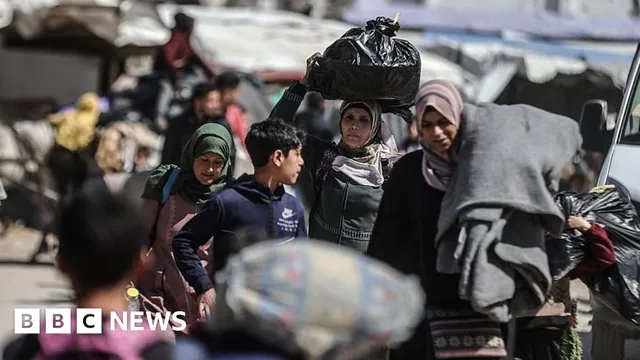
Red Cross chief warns Gaza faces catastrophic humanitarian crisis
2025-04-11 16:57- The International Committee of the Red Cross has reported that ongoing Israeli military actions in Gaza are leading to extreme humanitarian distress.
- Evacuations ordered by the Israel Defense Forces have displaced almost 400,000 people from their homes during the violence.
- Experts warn that without a swift resolution, the situation in Gaza may continue to deteriorate significantly.
Express your sentiment!
Insights
Gaza is currently undergoing a humanitarian crisis that has escalated following the renewed military operations by Israel which began on March 18, 2025. According to reports from various authoritative sources, including the International Committee of the Red Cross, the consequences of this conflict have led to a death toll of 1,542 individuals, as reported by the Hamas-run health ministry. An additional factor contributing to the dire situation is the forced evacuation orders issued by the Israel Defense Forces, displacing nearly 400,000 residents from their homes, further complicating the circumstances for civilians seeking refuge from the ongoing violence. The International Committee of the Red Cross' president, Mirjana Spoljaric, has expressed serious concerns regarding the extreme impact of military tactics, indicating a significant failure of international law and humanitarian obligations, while also labeling Gaza as 'hell on earth.' The UN human rights office has echoed this sentiment, warning that the tactics employed by Israel excessively threaten the preservation of a viable Palestinian population in the region. Amidst the bombardments, hospitals in Gaza are reportedly on the brink of running out of crucial medical supplies, raising alarms about the lack of humanitarian aid and the deterioration of living conditions for civilians, including children and the elderly. The humanitarian situation is at a breaking point, with the UN Office for the Coordination of Humanitarian Affairs (OCHA) describing the conditions in Gaza as 'absolutely catastrophic.' The ongoing conflict has led to substantial casualties and severe infrastructural damage, rendering critical facilities like hospitals and schools non-operational. As the international community observes, pressure is mounting on Israel to adhere to the Geneva Conventions, which outline protections for civilians and humanitarian workers during conflicts. Calls from various international leaders and human rights organizations urge immediate action to alleviate the suffering in Gaza. The blockade imposed by Israel is viewed as a violation of international law, while claims of targeting women and children during the recent conflict have raised questions about accountability and the morality of the warfare strategies in use. Unless these issues are addressed with urgency and transparency, the aftermath of this conflict may lead to long-term repercussions for the region’s stability and the wellbeing of its inhabitants.
Contexts
The Israeli-Palestinian conflict is a complex and multifaceted historical dispute that has roots dating back to the late 19th century, fueled by competing nationalistic movements among Jews and Arabs. The rise of Zionism, promoting the establishment of a Jewish homeland in Palestine, coincided with growing Arab nationalism, as local Arabs resisted the influx of Jewish immigrants and asserted their own claims to the land. Tensions escalated with the British Mandate over Palestine following World War I, during which both communities sought self-determination. This period saw increased violence and unrest, culminating in the 1947 United Nations partition plan, which sought to divide the land into separate Jewish and Arab states, but was rejected by the Arab leadership, leading to the first Arab-Israeli war in 1948 when Israel declared independence. This conflict resulted in significant demographic changes and the displacement of hundreds of thousands of Palestinians, creating a refugee crisis that continues to impact the region today. Post-1948, the conflict has been characterized by intermittent wars, uprisings, and peace processes, with notable events including the Six-Day War in 1967, which resulted in Israel’s occupation of the West Bank and Gaza Strip, areas claimed by Palestinians for a future state. The establishment of the Palestine Liberation Organization (PLO) in 1964 and the subsequent recognition of Palestinian rights have evolved over time, leading to a shift in international discourse and a greater push for a two-state solution. Despite various attempts at peace, including the Oslo Accords in the 1990s which established limited Palestinian self-governance, the situation remains fraught with tension, exacerbated by issues such as Israeli settlements in the West Bank, the status of Jerusalem, security concerns, and the right of return for Palestinian refugees. The 21st century has seen an increase in violence, including the Second Intifada (2000-2005) and periodic conflicts between Israel and militant groups in Gaza, most notably Hamas, which took control of the territory in 2007. These developments have entrenched divisions and heightened animosities, with ongoing military operations sparking humanitarian crises in Gaza and a perpetuation of cycles of violence impacting civilians on both sides. Internationally, while there has been widespread sympathy for the Palestinian cause, efforts to broker peace have often fallen short, hindered by entrenched interests, regional dynamics, and shifting geopolitical landscapes, particularly with the normalization of relations between Israel and some Arab states. In conclusion, the historical context of the Israeli-Palestinian conflict reveals a landscape marked by deep-rooted grievances, competing narratives, and unresolved issues that continue to challenge peace efforts. The legacy of past conflicts, displacement, and mutual distrust complicate any meaningful dialogue aimed at resolving the dispute. As of April 2025, the situation remains delicate, with new developments on the ground demanding careful attention from both regional actors and the international community, underscoring the necessity for renewed dialogue and commitment to a sustainable resolution.